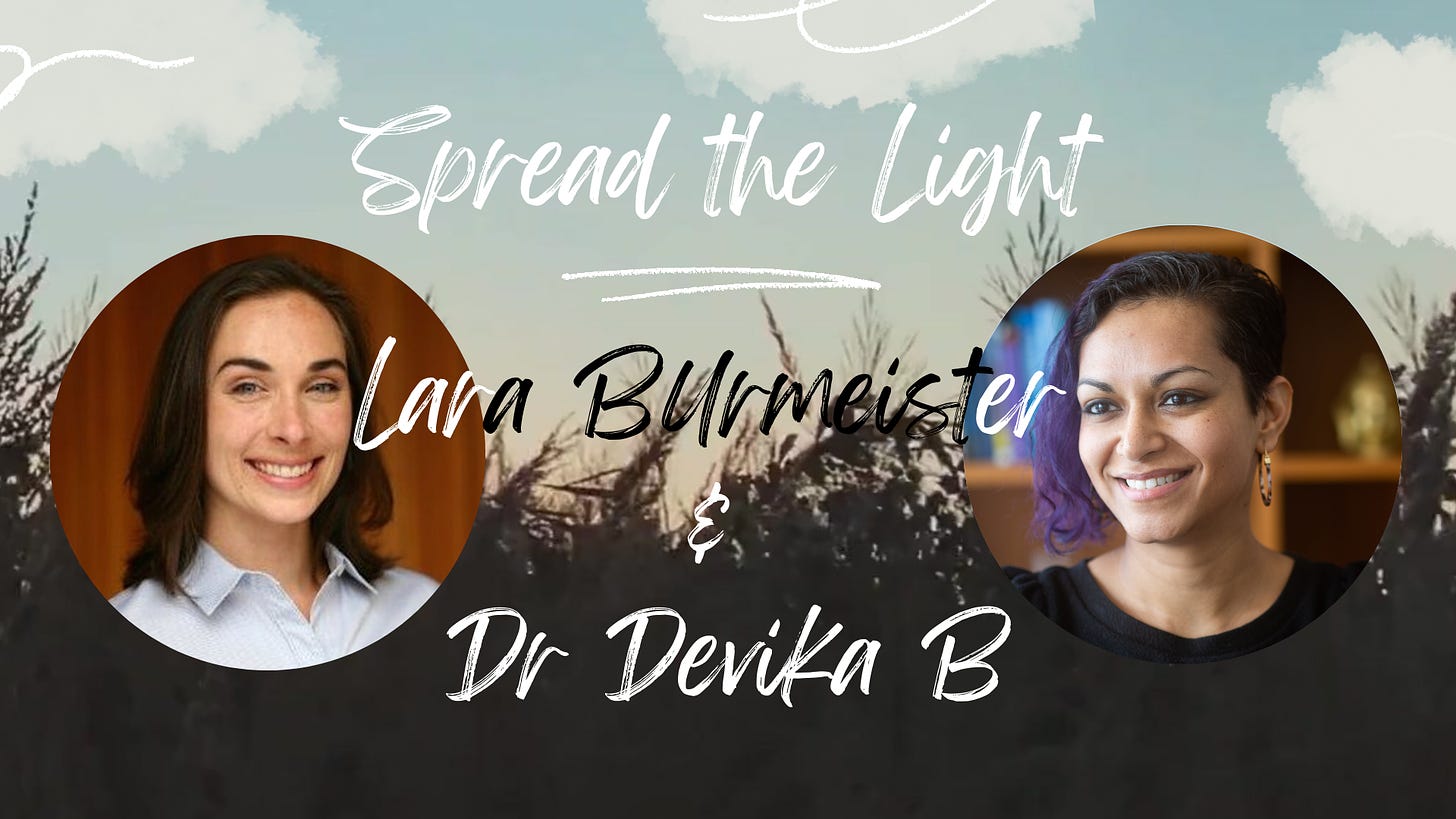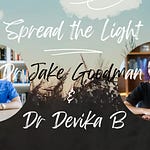Dear community,
Today, we have a wonderful new podcast episode featuring my college friend and incredible human, Lara Burmeister, on her hard-won lessons from living with depression.
💫 Spread the light with Dr Devika B. First-person accounts of living with mental illness that dispel stigma and stereotypes and instead, spread hope and light — also a YouTube channel and podcast on Apple and Spotify
Because stigma festers in the dark and scatters in the light
In this episode, hear about what Lara challenged herself to do to get through her darkest moments, her well-time and red flag toolkits, how depression changed her, and how she rebuilt her identity in its wake.
Lara Burmeister, MBA, is a first-generation German American who has spent most of her career working in roles to combat climate change. She lives with depression.
Above, you’ll find the audio recording of the podcast episode and below, a transcript. As always, the written conversation has been lightly edited for clarity and length.
If you’d prefer to watch this conversation, click here.
Trigger warning: In this interview, we talk about suicidal ideation and depression.
Click here to catch up on other Spread the light columns, in addition to other posts organized by column type, going back to our newsletter’s launch in January 2023.
If you or a loved one needs help for a mental health crisis, don’t hesitate to call or text 988 — or reach them online here. Find other resources here, search for a US treatment facility here, and find a US-based therapist here.
Wishing you light,
Dr Devika Bhushan
DB: Let’s launch in with our first question: How did your mental health journey begin?
LB: I would have to say — this might resonate with those who have dealt with depression: when you have depression, you may not identify an episode when it’s happening to you — so I really came to face it about seven years ago, when a really important relationship ended. And I fell into quite a deep cycle of depression.
And in that process of recovery, I came to recognize earlier periods in my life where I'd had depressive episodes. And so the first period was actually in college. That also had to do with the end of a relationship that... caused me to feel a lot of sadness.
And then again, when I was in business school, I had another episode, which really had to do with a shift in my sense of identity, as someone who had spent my early career focused on climate change, trying to reconcile the identity I wanted to build there.
I just remember sitting in these lectures and having these unusual thoughts about being worried about how I could end up being homeless, [while engaged in] these conversations about how you might face your career or what you might do in a prestigious setting.
Looking back, I could see the depressive signals.
But really the first time I faced it and got help for it was about seven years ago. And I’m happy to talk more about that.
DB: Yeah, oftentimes when we first experience mental illness symptoms, it takes us a while to recognize what’s going on and that there is help to be had to get better. And, you know, even the two of us — we were close in college and we stayed close through the other parts of our lives. But it was only recently, probably two years ago or so that we each opened up about our own mental illness histories with each other. And that not only enriched our friendship, but also helped normalize that experience even further for both of us.
LB: Absolutely. I think those are both so true. One, I think it takes multiple experiences with a mental illness to really get to a place where you can start recognizing it or where you seek help.
Since recovering from a very deep spell of depression — I still manage it; I still have smaller periods — but seven years ago, it was so deep that it took me two years to get from my kind of pre-depressive state back to a state that I felt reflected who I am as an individual.
It was that long. And that’s a very typical attribute of depression, that it’s a slippery slope in, and it’s a very difficult climb out.
Post that period, I have opted to be very open with others about that, just in recognition that even the closest of friends may not share their true mental health journeys because of the vulnerability it creates. Or the not knowing how someone may respond.
DB: And when you’re thinking about that two-year period where you were far from yourself, knowing everything that you know today, what would you want to tell your former self?
LB: I think that the key thing that helps me today is knowing that there’s coping mechanisms — knowing that there are tools to address both the depressive state when you’re deep in it and also tools to prevent you from coming into that state.
I think that the hardest part about your first episode when it is deep and you can’t just sort of swim your way out of it through your own devices, is that you just don’t have any of those tools. I probably only became aware of the tools I needed three months into it.
And you know, my deepest, darkest moment was: I had come to this place where I was so depressed and I think I stopped being able to eat and I stopped sleeping and then I stopped feeling like I could do work. And I ended up deciding to leave that role. I was like waking up with anxiety attacks and all sorts of things.
And so I was in this moment, in this conversation with family members. There was seven people at a dinner table and I wasn’t present. I was present with my own thoughts, but not engaging. And the thought I had was, ‘Well, I can try heroin now because it doesn’t matter.’ Amazingly, I had the ability to recognize [that moment as being a new depth of low]: ‘Wow, for someone who always cared about my intellectual capacity or being driven or being these things — to think it’s worth nothing, my life is not worth it.’
And that was a hard place to get to, and it took me months more to be able to come out of it because of the lack of tools. I just was surviving without them. It was this sort of slow cycle over 2 months, of needing to self-sustain, until I had therapy and was able to get prescribed medication.
And amazingly, I was able to get a great therapist who saved my life, for sure.
The truth is, depression is interesting because people have a tendency to say it’s situational and I’m a little concerned that I framed it situationally, right? Like, an incident happened and it led to this.
It’s easy to see it that way. But it actually took learning about cognitive-behavioral therapy to realize it’s not actually the incident. The incident represents the underlying core beliefs of what you are believe about the incident itself and the core belief you hold drives how you respond emotionally to circumstances.
And so through cognitive-behavioral therapy, it’s really about the identification of your core belief that is driving your dissatisfaction and in my case — if others are to hear this interview who know me, but don’t know me very well — they would be surprised to hear that I struggle because I was always the person who showed up prepared, showed up in an assertive way, seemed together, right?
And it’s because my internal belief was one very much of the achiever mindset: ‘I need to be productive to be worthy. If only I achieve this, if I get that A, if I go to that school — if I achieve this, I’m good enough.’
It took years of work to recognize that internal driver that was the force of my success was simultaneously the root of my unhappiness.
You wake up in the morning and you’re unproductive and therefore, you feel sorry or bad about yourself, right? Because the core belief is: ‘I’m only good enough if I achieve today.’
For me, it took me years to recognize that it wasn’t the relationship itself. It wasn’t my ex, Manuel. It was that he represented one of the only things I couldn’t achieve.
I had spent years going to some of the top schools, studying all the time, being just a very hardworking individual. And obviously relationships don’t function under that premise, but it was the first [time] I couldn’t work hard enough to manifest something I wanted. And then I wasn’t enough as a result of that.
That’s that work of recognizing the core belief that is driving your feeling. Cognitive-behavioral therapy is a tremendous tool when it’s done well.
And I’ll admit that I’ve seen many therapists who claim to do it. And they don’t.
And it took me actually taking a class on the fundamentals of cognitive-behavioral therapy to be able to apply it to myself.
And, you know, the premise being you identify the high-level thought, right? Which is: I feel bad about myself. And then you ask why. Well, I feel bad because I didn't get enough done today. And like, why? And if you keep asking why, you get to the root belief.
And the root belief is either a negatively kind of structured belief or it is a positively structured belief. So a negative one, as mine was: ‘You’re only worthy if you’re productive,’ needed to change to: ‘You are enough as you are.’
And people who work through the world with beliefs like, ‘It's okay to make a mistake.’ That's a great core belief. Or ‘I just have to do my best.’
My process was to get rid of the core belief that was leading to so much of a sense of unworthiness and to shift to one that says, ‘I needn’t be anything to anyone. I just can be.’
DB: Oftentimes, the tools and the inputs that we need — in your case, it was cognitive-behavioral therapy — you learned it through a class instead of where we think of normally getting some of these tools, which is through a therapist or a mental health provider.
And because there’s this element of hit or miss: One, can we even access a therapist? Two, can we access a therapist who has the tool bag that we need at the time that we need it? And three, is that an effective sort of alliance and relationship? And most of those conditions are usually not met.
I’ll tell you my own experience, too. I have been with therapists throughout my 14-year mental health journey. And my core beliefs are very similar to yours. And I’ve got a book here: The CBT Workbook for Perfectionism. It’s parallel to your class.
I did not find these tools and strategies through therapy. I found them here. It was recommended to me actually by a therapist, this book.
LB: My course was recommended, as well, through a therapist.
DB: There you go. But it’s so fascinating because the things that have helped us most, for so many of us, are outside of the normal healing sphere.
I want to ask you more about your tool bag today. There’s two kinds of tool bags: There’s the tools that keep you stable, healthy, whole throughout your well life, right? And then there’s the tools that you need to put into place when you feel yourself slipping in any given way. I’d love to hear more about both of those toolkits.
LB: When I was in the early stage of that depression where I was just sort of trying to swim with no ability to do so...
After that point that I described of feeling like, well, why don’t I just take heroin since it doesn’t matter anymore? I had always thought of heroin as this choice that you would lose everything, and why would anyone make that choice? And so for me personally, that conclusion was so poignant, because it was like, I’m ready to let go of everything.
DB: It was your moment of passive suicidal ideation, essentially, right?
LB: Absolutely. But it took two months from that moment to actually get an appointment and I should have, looking back, I would have suggested for myself to go seek a out-of-network therapist, but at the time I just went through my insurance.
I’m a very like intellectual, rational thinker. And so I started just looking online for books. And I read a book that I would recommend to anyone who is dealing with depression called The Upward Spiral.
It’s three sections: First, your neurochemistry — what are the parts of your brain and what do they do? Second, how your brain goes into a depressive cycle — what are the neural pathways that you're re-triggering and reinforcing? And then third, how you actually can use all of these non-medicated means by which you can get out of depression: whether it’s the daily gratitude practice, exercise, speaking with friends, all of those types of tools.
And for me, that book was tremendously valuable because it allowed me to disassociate, kind of to separate my sense of ‘I am a problem; there’s something wrong with me’... to my brain is not working. Like my brain is doing something that it’s not supposed to do.
And I need to redirect the course of those neural pathways.
And that’s the thing that is so important about depression is to recognize that the cyclical thinking of ‘I’m not good enough, I’m not good enough,’ or ‘No one cares about me,’ — the more your brain thinks about it, the more it reinforces the pathway, the faster it will go to that thought.
And so it’s an active process of re-carving new pathways.
And it’s active work that has to happen, which is why things like a gratitude practice matter.
And so for me, secondarily, the recognition that psychologically, when we read things, we can reinforce an idea through reading, right?
It’s sort of like if you say something out loud, you’ll hear it, start coming to believe that.
So I use a lot of mantras. That’s one of those tools — remember the mantra and say the mantra.
DB: What are some of yours?
LB: I’ve had different ones over the years, but in that initial episode: it was: ‘Nobody’s watching your movie,’ which is a really strange mantra, but it came from this self-judgment place of being so concerned that people would look at my choices — like I went to this great school when I did this cool thing and then I went to these other good schools and then I just dropped my career, right? I just literally left my job and like started running a bar, you know, and I was so worried about the judgment. And it was the judgment I felt about myself in that moment.
And so ‘Nobody’s are watching your movie’ was just like, ‘Why are you living in this world as if you're the character of some movie that everybody's watching?’ Nobody’s paying any attention. There’s freedom in relinquishing that sense that you are the center of everyone, that somehow judging eyes are perceiving you.
And the recognition that the friends who care are not the ones who are judging. At that time, it was very important because I was judging myself very actively for what I saw as a lack of capacity, which when you're a productive-oriented person, is a very harsh judgment, right?
To not be able to be capable.
So some of my mantras [convert] rigid thinking to flexible thinking.
So a rigid thought is one that’s like, ‘I should be this,’ or ‘I must be that.’ ‘I must know how to do this.’ ‘I must be a great parent.’ ‘I must turn this in on time.’ These very kind of harsh structures that you say to yourself internally.
And flexible thinking is the process of shifting that to, ‘I would prefer..., but I can tolerate...’ ‘I would prefer that I could get this in tonight on time, but I can tolerate that I can’t.’ ‘I would prefer that I knew how to do this.’ 'I would prefer that I was performing excellently.’ ‘I would prefer that our relationship was this, but I can tolerate...’
And that kind of positive thinking of what you’re capable of, while relinquishing the demand is a really, really great way of combating those kind of cyclical thoughts.
DB: I love the realism there. In the way that we shift our rigid thinking into more cognitive flexibility, emotional flexibility, and more just grounded in what we are capable of at that moment, rather than this perfect ideal that we're constantly striving for that’s just not attainable.
LB: Yeah, and we put all this pressure on who we need to be and it’s the root just of general unhappiness beyond depression — just feeling dissatisfied. Actually, Marc Maron's podcast was super helpful to me. It’s not about mental health, but he’s very open about his fight with anxiety, his issues with addiction. And in some of my lowest moments, he was a friend to me.
I’m actually a strong proponent of medication. During that time and on and off, I take an SSRI, and that’s very helpful. When you recognize this is a neurological situation and you’ve started forming these pathways, that medication can be extremely effective in sort of rerouting and preventing some of the really negative thoughts, or not letting those thoughts make you experience such an emotional depth from them.
You still have the thoughts, but you don’t have the emotional sort of devastation that they result in.
I’m very aware of my the signals where I can see that I might be heading into something: whether it’s not sleeping as well, or getting upset or caught on an idea that’s circling, or not wanting to wake up and get up in the morning when my alarm clock goes off.
I see those and I’m just more paying attention, right? And I think in depression, it’s incredibly important to keep an eye or attention to how are you doing internally?
Because being able to shift that thought early is the difference between having a depressive period of a couple of weeks to six months to two years.
And for me, the goal is to not let it transcend into a long period.
DB: Yeah, absolutely. And so what do you do differently when you notice your alarm clock going off and not wanting to wake up or any of these other signs?
LB: So that book, The Upward Spiral: I follow most of the guidance there, which is: exercising is tremendously important; meditating is very helpful; speaking to friends when you don’t want to — actively force yourself to pick up the phone and have that call; the gratitude practice; I started doing a lot of yoga. And that’s still a practice that I do as a preventative. It’s helpful in having mindfulness and enjoying my life.
And actually one other tool I used in the depths... this is pre-medication, just me trying to come up with my own ways of coping.
I quit my job. I was really struggling and I said, ‘Okay, on any good day, I just need to do two out of these four things. And if I can just do two of these, that’s good enough.’
Exercise
Do something nice for myself
Do something nice for somebody else
Do something “productive,” — but productive meant shipping a letter — the minimum
And I would live these days just tallying those things. That framework allowed me to just like deconstruct it to the basics where I’d say, ‘What do I do? I just need to take a walk. I just need to say something nice to someone else or to myself.’
And two is enough. And three is fantastic. And four knocks it out of the park, right?
It’s these reframings of like, what is enough?
Now I feel like I’m a very contented person because I’m not seeking things that don’t matter, right?
DB: Yeah. And when you’re feeling your worst, it can be so difficult to get up the gumption to do even a small thing that matters and puts you on the path to feeling better. And for you to give yourself this incredible framework of a checklist of 4 things, and it can just be something small — like I said, something nice to myself — it’s just such an empowering self-toolkit.
LB: Exactly.
To lower what ‘good’ is. Just to give yourself permission, and to create a framework that allowed me to feel okay, while I had no structure and no sort of routine or sense of self.
Those are the things that I tap into — when those aren’t enough, I will re-medicate.
DB: Thank you for sharing what’s in that red flag toolkit for you. And to know that there’s different layers of it, right? Like, you might escalate on the exercise, on the friends, you know, on the yoga. And if when that's not enough, there’s another tool in your toolkit and you go to medications as you need them.
LB: Exactly. I’m very pro-medication.
That book enabled me to not feel a personal sense that somehow because my brain wasn’t functioning correctly, that it was me. And I think that’s the challenge with mental illness — we have such this conflation between your brain and your identity. And somehow, we treat it as if it’s this totally taboo or problematic attribute when it’s just like anyone having a thyroid problem and taking medication for that.
I really do tell people, ‘Hey, you should be investigating how to correct your neurochemistry.’' And there was nothing wrong with needing a medication to do that.
I think the challenge for many people is just the ramp-up period can feel uncomfortable, you know — it often takes people two months before they feel anything. You might be suffering in that period and side effects can be difficult, depending on what you’re on. So just that process of calibrating is a commitment.
DB: Right, and waiting for the benefits to really settle in, exactly as you’re saying, in this ramp-up period where you’re dealing mostly with potential side effects. And a lot of people in that period of time will lose heart and not stay the course or, and this happens a lot — you’re on the wrong medication for your brain at that moment. And that process of really settling into the right one and finding that trial-and-error fit, can be really disheartening and frustrating as people are struggling.
What is one myth about the mental health space that you’d like to settle the score on?
LB: I think that there is a perception that only some people deal with this, right? That it’s only under certain circumstances or with certain kind of conditions that are genetic or that it’s limited. And I would argue that mental health is pretty pervasive.
And when you shared your experience with me, you know, I was so surprised to hear it because when I thought about you as a friend in my life, I would say, ‘Devika is one of the most solid, grounded, consistent, you know, people that I’ve ever met.’ And it’s just not an association that's typically given to a bipolar diagnosis.
And I think similar to me, when I am going through depression, I am able to create a tough face, right? Like, when I left my corporate job, I felt as though I was like leaving with a dark mark or my tail was between my legs and that my raw experience was out there for everyone to see.
And recently, coming back into the energy field, I reached out to friends to whom I hadn’t shared at that time what I was experiencing and they were like, ‘Wow, we had no idea what you were dealing with. Like, you just seemed so together.’
And I just think there has to be more empathy and recognition that so many people are dealing with periods of depression; anxiety is very prevalent; whether it's bipolar disorder or other things — there’s just a huge percentage of the population. And we need to stop treating it like it’s a subset of the population when actually, this thing in flux for most people, right?
And that’s where I think there’s this bifurcation of those who deal with mental illness and those who don’t. And I don't think that that’s true.
DB: Yeah, I love that. You really can't tell from the outside who might be struggling with a mental health condition, because the truth is that it might take all of your energy and all of your willpower to present a face of neutrality, or ‘I have it all together,’ even when you are at the lowest depths of a depression or a different kind of a mental health experience.
And because these can be invisible. And again, they can strike anybody.
There’s not like one kind of person or personality type that ends up having a certain kind of a disorder. I just saw a study that said that more than half of the population will be diagnosed with a mental health condition by the time they turn 75.
That’s the majority of humanity. And so if it’s not us, it’s our brothers and sisters; it’s our parents; it’s our kids; it’s our neighbors and friends.
And no one wants to look different. And so we do a really good job of zipping it up and acting like nothing’s happening. [But] it takes everything out of you. When you’re depressed, you put up that face and then you collapse the second you’re on your own because you're like, ‘Phew, I don't have to put all my effort in.’
LB: You walk out of the office door and then there’s just like tears streaming — this holding together and this letting go.
And during the period of depression, I was very protective, right? I felt tremendous sense of vulnerability, like the fear that, like, what if I give this information to someone and they don’t hold it for me. Like when you confide in a friend and they’re not there in the way you need, right?
The comments like, ‘Why can’t you just get it together?’ Or, you know, the wanting to be helpful, but not recognizing that this is not a just-snap-out-of-it situation.
It’s such painful experience when you're in that vulnerable space.
And so now, it’s arguably — of all the things I care about in my life, being a person who can be vulnerable and share and hold space — this is the most important thing to me because people need that. They need someone who says, ‘I’m here, I can hold it, and it’s okay.’
DB: Yeah, and you are not alone.
LB: And you're not alone — it’s not your fault.
DB: And you will be better. I’m so proud of you for being in that place and for having that as part of your mission.
LB: Yeah, I‘m very forthcoming with people about my experience.
DB: I love everything about what we just talked through and I’m just so blessed and privileged to have you in my life. Thank you for being the person that you are. And I’d love to hear about how you think about your mental health journey as having driven some of your unique assets or even superpowers.
LB: Yeah, exactly. I was reflecting on this a bit and when we met before all of this, I was probably described as just being extremely confident, right? Just walking into a room and having sort of an assertive energy and like, ‘I’m going to get this done.’
And I was sort of described as like, ‘Oh, she’s intimidating.’ Even in graduate school, that was sort of a reputation I had just because I have sort of that German first-generation intensity of just being direct.
But I just didn’t really have that capacity for recognizing when others weren’t okay. And I didn’t have the empathy, right? Like it didn’t make sense to me. It’s like, ‘Just get it done' — that was my mindset.
And I think through that experience of really hitting rock bottom, like I felt like I was standing on the one side of a mirror and I could see my former self on the other.
And I wasn’t there — like that type of disassociation.
And in that depth, I couldn’t say about myself, ‘I’m kind, and I’m competent.’ I just couldn’t manifest those words. And that was so distant from my true self, from my healthy self.
But when I came out of it, now my priority is very much about ensuring others are okay.
So if I’m working with people, I’m paying attention to the signals of, ‘Oh, they look tired this morning or they don't look okay.’
And then taking the time when I’m in a leadership position to make that space. When I was dealing with mine, like my crisis, I did not feel that my boss at that time could make space for me, that there was space to be honest, that I was struggling with something. That really, I should have taken two months of mental health leave, but I just didn’t have a counterpart that I could trust with that.
As I think about myself in the workforce and in my day-to-day, I care so much about what is the temperature of the room and how are other people reacting. That you create the space that someone feels safe to share and to inquire like, ‘Hey, you seem a little different today; is everything okay?’ in a private setting.
And so I think my priorities have shifted greatly. And how I think about what it means to be a good colleague and being a good person to others. It’s really about creating that space that I just frankly didn’t when I was younger. I wasn’t aware of it in the way that I am now.
DB: That’s so powerful. Because you are one of the most warm and empathic people, and it's really interesting as you look back on your journey to think about kind of the pre-depressed Lara, maybe didn't have those same cues and understanding of what different could look like, or what a struggle could look like. And now through that, you’re so attuned to these cues and needs of people around you because you didn't have that, right?
LB: And I think the other thing I’m so much more capable of now is true gratitude in the present.
And that any day that I wake up just in contentment, like not even happiness, but just at ease — it’s a day that I cherish because in all of those days that you wake up and it’s not, you're suffering. To be at peace and to value that.
And I think depression is very complex and again, I think it shouldn’t be limited to a sense that it’s situational.
For me, it was an unbuilding of an identity.
And again, it’s those beliefs you have of what you need to be to yourself and to others that can create the context for a depressive mind, right? To feel like you are not enough, to feel you are not achieving.
And so I have to sort of deconstruct all of myself to be able to reconstruct it in a way that had a healthy framing. And, you know, it's very like, in line with Buddhist thinking, but just not feeling like my ego matters so much. And more, how do I treat others?
DB: This really poignant phrase — about breaking yourself down and then rebuilding yourself anew — how long did that process take you?
LB: I think it’s a continual process, but it took me two years to go from the initial sort of bottom to a sense of my normal self, in the sense that I wasn't feeling a tremendous amount of shame or I wasn’t actively in a depressive state.
And then I think it took me probably two more years to go from feeling the shame of this fall — from my perspective, no one else’s — I had fallen from some sort of path of career performance… and just took myself off a ledge, to get okay with that and to forgive myself. That took two years.
And then it took two more years. I was thinking like, ‘Okay, now that I’m okay, how do I rebuild every brick so that my foundation is not based on something that’s so precarious?’
And you know, your core beliefs often stem from your nuclear family, right? And it’s not a reflection that somehow you have a problematic family.
But, as I’ve relayed, I’m a first-generation German American. Both of my parents are German and culturally being productive, being useful, is a part of that culture. And so when I started talking to my Mom about this identity and this idea, ‘Oh, I have this core belief that I have to be useful,’ she opened up that she has that core belief also.
And I grew up in a family that was kind of like, ‘If you're going to do it, do your best.’ right? Or: ‘If you want to do it right, you’ve got to do it yourself.’ ‘Be perfect. Do it the right way.’
And I think I had to really let go of those and build my own. And I think once you start building your own, you’re able to free yourself of the expectations of others. And for me, it’s a continual process of adjustment.
Like, I’ll fall into old patterns of wanting to achieve X or Y, or wanting to be seen a certain way. But I think that my core now is: if you think about what you want people to say in their eulogy about you, I don’t care that anyone thinks I’m smart, you know, that I did XYZ.
I just want people to say, ‘She was kind.’ That’s it.
And if that’s all I need, then all I need to do is walk through life trying to be kind, right? And that is a much healthier version of what I want to work towards. And it reframes a lot for me and how I interact with people and how much urgency is necessary in any given moment.
DB: It’s not easy to do such deep and intensive work to rebuild yourself to a place where you feel more stable and whole and kinder and can focus on the things that have importance because they match with your values rather than sort of the shoulds.
LB: And you know, my parents never said you have to be perfect. But when you were in some of these schools as well, there is this pressure to perform, right?
Like there’s a reason there’s an A and there’s an F and there's a reason why we celebrate those who get As. And when you live in that system, you get this really comfined view.
It’s so common. And I think everyone deals with mental health.
Many, many of my friends who are “high-achieving” struggle with mental health because of that internal narrative of ‘I need to achieve X in order to be okay.’
And the truth is none of us need to achieve X to be okay.
DB: Agreed. Final question for you: what do you hope for us collectively for the future?
I so much hope that we can be in a society where there’s space for people to find their sense of contentment. And I think, you know, in the long course of history, I do see a line of progress, but I wish so much that people could live in their true version of themselves, of what their values are, and then they can move through life with those values, rather than feeling like they need to subscribe or fit within some other person’s view, or some societal view and constraint.















Spread the light: Lara Burmeister's journey with depression